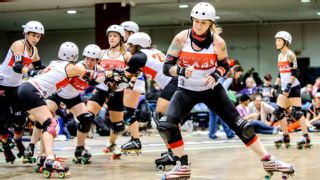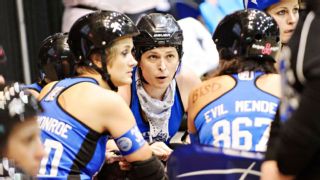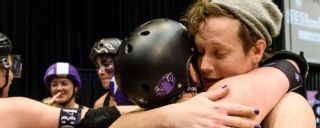ST. PAUL, Minn. -- Josie Simonis played every team sport they could get their hands on as a kid. Simonis wrestled, played football and baseball -- "It was a major part of my life." But to get access to all those fields, Simonis had to check an often-misunderstood identity at the door. The world saw Simonis as a boy, but Simonis didn't have the tools or language to describe themself.
"I was queer and I was an athlete, but I wasn't a queer athlete or an athletic queer," said Simonis, who prefers the gender-neutral pronouns "they" and "them." "Those things didn't exist."
As an adult, Simonis took a hiatus from sports. Simonis was in graduate school at Cornell working toward a PhD in ecology and environmental science -- busy enough, even without coming to understand who they were as a person and taking the steps to transition. It was like a second puberty, Simonis said, and since team sports had been such an important outlet before, Simonis, who is 6-foot-2, jumped at the chance when someone said roller derby was a place that welcomed transgender athletes.
"That was fantastic," the 31-year-old said, "but then I had to learn how to skate."
It was 2011, the year the Women's Flat Track Derby Association -- the governing body for most roller derby leagues -- adopted its first inclusion policy. (Full disclosure: I was a member of WFTDA from 2007 to 2014 and privy to internal conversations leading up to the original policy.) For many of the trans women who play, the policy was imperfect. It required that a person be medically transitioning into a woman, which excluded a narrow slice of a growing group of transgender people who don't define themselves along traditional gender lines or want to have surgeries.
But that first policy was the start of a conversation, and that conversation is changing pretty dramatically. Since its resurgence as a grassroots women's sport in the early 2000s, roller derby has been one of the most inclusive sports around. Gay, bisexual and straight players participate in men's and women's leagues without judgment.
Last weekend, Simonis -- who started skating under the derby name Trannysaurus wrex and now skates under their legal name, Ms. Dr. Joseph L. Simonis -- was an alternate skater as Rose City won the WFTDA international championship. All around the event was evidence of the evolution in derby, where you could choose between a "Strong Athletic Skater" and a "Strong Athletic Queer" T-shirt. At Roy Wilkins Auditorium, there was an all-gender restroom on the second floor. There were men and women, skaters, officials and spectators who identified across the spectra of gender and sexuality.
"I very much feel like I'm part of a family of incredibly talented athletes who are so devoted and working together as a team," Simonis said. "I definitely have that, but it's taken a while to get here."
Simonis is one of dozens of trans skaters now in the league, and they weren't the only one on a roster at the championship tournament last weekend in St. Paul.
In 2010, Penelope Nederlander took a skills class with the LA Derby Dolls, who skate on a banked track. She loved it, but as a newly transitioned athlete, she wasn't even sure she was eligible to play.
"I approached the league and I said, 'I'm trans. I'm not sure I should try out,'" said Nederlander, who now skates as Fifi Nomenon for the Texacutioners.
The league didn't have a policy on trans athletes, but within a few days of Nederlander's question, they created one. They asked Nederlander if her driver's license had an "F" in the gender column. She said it did, and the league said that was good enough, without even asking to see the ID.
"I wasn't really interested in making waves because I'd identified [derby] as a really important place for women," Nederlander said, "but it wasn't even an issue."
She was the team captain at the WFTDA championships last weekend. Nederlander is also a member of Team USA, the national all-star team that competes internationally.
Since enacting that first policy, the skater-run WFTDA has listened to its membership. For the most part, members want to open the door even wider to a group of athletes who often struggle for acceptance. To that end, WFTDA released a new gender policy this week.
"It's much more inclusive, with a self-identifying approach," said Michele Donnelly, a sociologist at Kent State who skates as Eduskating Rita and is secretary of the WFTDA board of directors. "If women's flat track derby is where you see yourself, whether or not you identify as a woman or use women's pronouns, we're making sure there is something here for you."
When WFTDA started considering the inclusion of trans skaters in the mid-2000s, there was concern it could dilute the concept of an all-female sport, something distinct from the female versions of men's sports that came before.
"The primary concern for the membership, as I remember, was a sense of competitive advantage," Donnelly said, "which the evidence just doesn't support. We have athletes who are trans at elite levels and some are not -- like the rest of the population."

Said Gotham Girls all-star Sarah McKemie, who skates as Sexy Sladie, "I think for skaters who are straight to be around my teammates who are [not straight], it's good for everybody to be friends with someone who is different from you. It opens your eyes to the way people live and makes you more empathetic."
As the culture moves toward a greater, though imperfect, acceptance of gay and lesbian professional athletes, transgender athletes have traditionally faced greater stigma. Witness the reaction to Caitlyn Jenner, which was part celebration and part rejection. Our culture is predicated on the idea of two genders starting with the color of your baby blanket, and sports is a place where that binary is firmly cemented.
Some of the International Olympic Committee gender-testing standards have led to damaging practices for women who were born with an unusual blend of hormones or other characteristics -- women who might not fit into a rigid definition of female. Many in WFTDA were glad to remove the medical requirement from its policy.
"As a member-driven organization, we can define women in the way that's most appropriate for our organization," Donnelly said.
For Simonis, that was important, even if the process of generating a rule change meant they had to be part of the league's growing pains at a personal cost. There were some difficult interactions along the way, but Simonis continued to speak up for inclusion, even though they technically qualified to play under the old rule.
"I see people who don't have access," Simonis said. "Yes, I'd be rocking the boat, but it's a boat that needs to be rocked sometimes."
Erin McCargar, 34, had trained in martial arts since she was 9, but quit at 18, deeply troubled by how her evolving sense of self would affect her ability to maintain institutional acceptance.
"I felt like I was a disgrace to my [martial arts] school because I am trans," McCargar said, "and that wasn't something I could vocalize."
McCargar had gender reassignment surgery in 2010 and married her long-time partner, Melissa, who has loved McCargar at every moment along the journey.
"[Transitioning] brought me to a place where I wasn't hating my body, but I wasn't loving it either," McCargar said. "Something was missing, and it was the expression of ability and pure intent. Derby is one of the few times when my brain shuts up and does what it's supposed to do. That singularity of purpose reconnected me to my body in a way I hadn't done in 15 years. I was rediscovering who I was as a physical being."

Genevieve Berrick, a queer journalist who covers the sport for DerbyCentral.net, notes the trans women who are facilitating the policy changes at WFTDA are doing it at some personal cost. Several of the people interviewed for this story related moments of despondence during their journey, even as they came to a better place.
Berrick covered the suicide last spring of a junior skater named Sam Taub, portions of which were later excerpted in The Advocate.
It's not enough to change policy, Berrick said, but it's about consciously creating a welcoming space. "I think trans women are really starting to be supported."
The issue of inclusion has been coming up in other realms as well. Last week, federal education authorities ruled that a transgender girl could use the girls' locker room in her school district outside Chicago, and Houston rejected an ordinance that provided several groups, including transgender people, protection from discriminatory policies.
As fear and acceptance of trans men and women square off, there is concern that WFTDA's new policy won't include everyone.
After playing women's ice hockey as a young adult, Maxwell Schneider (who also prefers the pronouns they and them) pulled back to focus on their health. They found derby and immediately took to the track like a fish to water. They opened a skate shop in Columbus, Ohio, called Next Level and started teaching derby skills as a personal trainer.
It's a community that Schneider, aka The Smacktivist, doesn't want to give up. Although born female, the 24-year-old Schneider increasingly identifies with stereotypically masculine traits but doesn't want to lose their ability to skate for WFTDA. There is a brother league, Men's Roller Derby Association, but Schneider said it doesn't feel like home.
"The funny thing is that's my biggest concern and that's why I haven't really pursued [transitioning]. ... I don't want to build community with men, and I don't want to be on a team with men," Schneider said. "I have this female passing privilege. People are not going to question me playing. But there are so many trans skaters who are more woman than I am."
As Schneider talked to teammates about their changing thoughts on their identity, the league made an effort to get it right. Skaters would approach announcers about what pronouns to use when announcing everyone, and later those announcers would fact-check with Schneider to make sure it worked.
"That brought me to tears sometimes, because people are really trying," Schneider said. "In derby there really is a place for everybody. People bring all sorts of things to derby. Because it's skater run, that makes the league better. People are valued for who they are."
Danni Michaeli, a New York City-based psychiatrist who deals with trans topics in his practice, said ideas of identity are radically evolving. When it comes to gender, people are able to decide who they are and how they want to be seen. The idea of a binary, of an either/or when it comes to gender is also evolving. But it's not just gender; he compares it to a more mainstream trend.
"The way we experience ourselves now as we age is completely different than the way we did in the past," Michaeli said. "No one wants to be contained by preconceived ideas of what we are expected to be."
For some, that preconceived notion is gender, and for a growing number of people, that is a more fluid idea than it has ever been.
"I've never been super into communities that are based on a single identifier," Nederlander said. "I don't gravitate toward trans or lesbian communities. I gravitate to people for who they are and the activities I enjoy. We're here for roller derby; we're not here for trans roller derby or straight roller derby or gay roller derby."
Hundreds of women are now skating for teams across the country, with some like Nederlander encountering open arms and others like Simonis having to get through gatekeepers at one level or another. But once in, many have found a community where they can be themselves and play a sport in bodies that feel like their own.
"They are making an attempt to be welcoming and accepting," McCargar said, "and not just merely tolerant."

